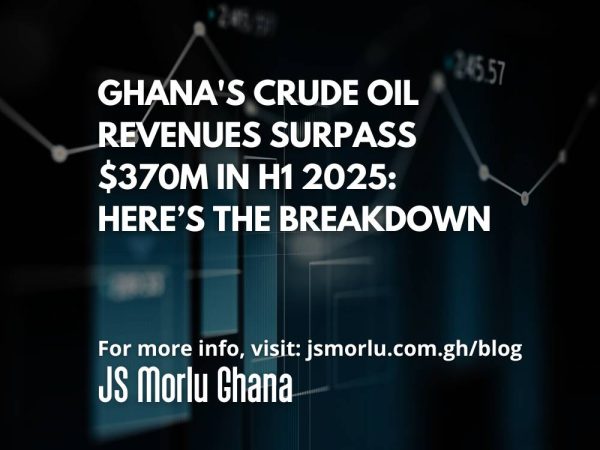Ghana’s Petroleum Performance: A Mid-Year Snapshot
Ghana’s petroleum sector made significant financial gains in the first half of 2025, bringing in $370.62 million from crude oil activities alone. The data comes from the official First-Half Petroleum Semi-Annual Report, providing a comprehensive view of oil-related earnings from January through June.
Where Did the $370M Come From?
Let’s break it down:
| Revenue Source | Amount (USD) |
|---|---|
| Crude Oil Liftings | $218.62 million |
| Corporate Taxes | $148.75 million |
| Surface Rentals | $863,045 |
| Petroleum Holding Fund Income | $2.376 million |
- Crude Oil Liftings
The bulk of the revenue $218.62 million came from Ghana’s direct liftings of crude oil between January and March 2025. This represents the government’s share of oil production from fields operated by companies like Kosmos Energy, Tullow Oil, ENI Ghana, Vitol, and Petro SA. - Corporate Taxes from Oil Companies
Corporate income taxes from upstream oil operators contributed $148.75 million. These taxes are essential in financing public programs and are directly tied to the profitability of multinational oil firms operating in Ghana.

Ancillary Earnings: Rentals and Holding Fund Inflows
- Surface Rentals
Surface rentals fees paid by oil companies for land use brought in a modest $863,045. Though small compared to lifting revenues, they’re a steady income source tied to license agreements. - Petroleum Holding Fund (PHF)
Ghana also earned $2.376 million in interest and other income through its Petroleum Holding Fund, where all oil revenues are initially deposited before disbursement.
Ghana Petroleum Funds: Investment Growth
Beyond direct revenues, Ghana’s petroleum-linked investment funds showed strong growth:
| Fund Name | Investment Value (USD) |
|---|---|
| Ghana Petroleum Funds | $1.424 billion |
| Ghana Heritage Fund | $1.301 billion |
| Ghana Stabilization Fund | $122.9 million |
These funds are designed to serve long-term economic goals:
- Ghana Heritage Fund (GHF): Acts as a long-term savings mechanism for future generations. It received the lion’s share of investment at $1.301 billion.
- Ghana Stabilization Fund (GSF): Acts as a buffer against oil price volatility and shortfalls in expected revenue. It held $122.9 million in H1 2025.

Why This Matters
This semi-annual performance is more than just a fiscal update, it’s a barometer of Ghana’s economic health and investment potential. Oil revenue plays a critical role in the country’s:
- Budget financing
- Debt management
- Infrastructure projects
- Social spending
The strong mid-year numbers suggest improved operational efficiencies and favorable global oil prices, giving the Ghanaian government fiscal space for key national initiatives.
Final Thoughts
While Ghana’s oil wealth continues to yield dividends, long-term sustainability depends on:
- Transparent management of petroleum revenues
- Responsible investment in social and economic infrastructure
- Diversification away from oil dependency
As the second half of 2025 unfolds, stakeholders, investors, policymakers, and citizens alike will be watching closely to see how these revenues are utilized.
